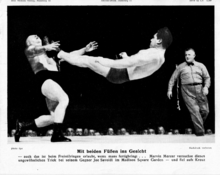This article needs additional citations for verification. (January 2007) |




A dropkick is an attacking maneuver in professional wrestling. It is defined as an attack where the wrestler jumps up and kicks the opponent with the soles of both feet; this sees the wrestler twist as they jump so that when the feet connect with the opponent one foot is raised higher than the other (depending on which way they twist) and the wrestler falls back to the mat on their side, or front.[1] This is commonly employed by light and nimble wrestlers who can take advantage of their agility, and is often executed on a charging opponent, while charging at an opponent, or a combination of the two.
The most basic form of a dropkick, but potentially the hardest to pull off, is a standing dropkick first used by "Jumping Joe" Savoldi where the wrestler catches a standing or running opponent with a standard dropkick from a standing position. In order to be pulled off effectively, it requires great leg strength in order to gain elevation. Savoldi, a former All-American running back for Knute Rockne at Notre Dame, used his association with football to identify the move as the "drop-kick"[2] and the press also called it a "flying dropkick".[3]
The dropkick in its current form was thought to perhaps[4] originated by "Jumping Joe" Savoldi, although wrestler Abe Coleman, known as "Hebrew Hercules" and "Jewish Cougars", can also be seen in early video using a feet-first dive at an opponent's waist. Coleman, listed at 5'2" in height, called the move a "Kangaroo Kick"[5] and claimed the move was inspired by kangaroos he saw on a tour of Australia in 1930.[6] When Savoldi performed the "drop" kick in 1933, the press simply said it was another name for Coleman's existing "kangaroo" kick specialty.[3]
- ^ "Professional Wrestling Moves: Part 1". Death Valley Driver.com. Archived from the original on 2013-05-06. Retrieved 2007-11-29.
- ^ "JOE SAVOLDI WINS MAT BOUT IN PHILADELPHIA". Times Leader. 18 May 1933. p. 17. Archived from the original on 12 February 2019. Retrieved 6 June 2018.
At no time did Savoldi attempt to employ the new attack that he calls "drop-kick." Once he offended the rules by using a flying tackle, but for the most part Joe relied upon orthodox holds.
- ^ a b "10,000 FANS SEE LEWIS WIN FIFTH WRESTLING TITLE". St. Louis Star-Times. 16 May 1933. p. 14.
Joe was unable to return to the ring after missing a flying dropkick. "Flying Dropkick." The 202-pound Savoldi appeared superior to his elderly 240-pound opponent during most of the match, but lay helpless on the floor after hurtling from the ring when he jumped into the air and tried to kick Lewis in the chest with a "flying dropkick." This is another name for the "kangaroo kick," the quaint specialty of Abe Coleman. Some 10,000 fans saw the former Notre Dame All-American fullback repeatedly bowl over the former champion and twice he used his "flying dropkick" before Lewis sidestepped and permitted the ex-collegian to hurtle through the ropes to the floor outside the ring.
- ^ "WHAT'S HAPPENED TO OLD-TIME FAVOURITES?". 10 June 1949. Archived from the original on 16 June 2011.
Joe Savoldi, perhaps the originator of the dropkick
- ^ "Clipped from the St. Louis Star and Times". The St. Louis Star and Times. 16 May 1933. p. 14.
- ^ Martin, Douglas (April 2, 2007). "Abe Coleman, 101, Wrestler Known as Hebrew Hercules". The New York Times. Archived from the original on 16 June 2008. Retrieved April 23, 2010.
his pièce de résistance was the drop kick, a still-common tactic in which a wrestler turns himself into a human missile. Coleman said he learned it from kangaroos on a 1930 trip to Australia.